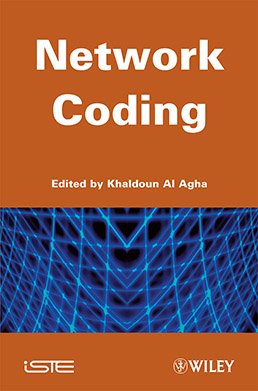
Network coding, a relatively new area of research, has evolved from the theoretical level to become a tool used to optimize the performance of communication networks – wired, cellular, ad hoc, etc. The idea consists of mixing “packets” of data together when routing them from source to destination. Since network coding increases the network performance, it becomes a tool to enhance the existing protocols and algorithms in a network or for applications such as peer-to-peer and TCP.
This book delivers an understanding of network coding and provides a set of studies showing the improvements in security, capacity and performance of fixed and mobile networks. This is increasingly topical as industry is increasingly becoming more reliant upon and applying network coding in multiple applications. Many cases where network coding is used in routing, physical layer, security, flooding, error correction, optimization and relaying are given – all of which are key areas of interest. Network Coding is the ideal resource for university students studying coding, and researchers and practitioners in sectors of all industries where digital communication and its application needs to be correctly understood and implemented.
1. Network Coding: From Theory to Practice, Youghourta Benfattoum, Steven Martin and Khaldoun Al Agha.
2. Fountain Codes and Network Coding for WSNs, Anya Apavatjrut, Claire Goursaud, Katia Jaffrès-Runser and Jean-Marie Gorce.
3. Switched Code for Ad Hoc Networks: Optimizing the Diffusion by Using Network Coding, Nour Kadi and Khaldoun Al Agha.
4. Security by Network Coding, Katia Jaffrès-Runser and Cédric Lauradoux.
5. Security for Network Coding, Marine Minier, Yuanyuan Zhang and Wassim Znaïdi.
6. Random Network Coding and Matroids, Maximilien Gadouleau.
7. Joint Network-Channel Coding for the Semi-Orthogonal MARC: Theoretical Bounds and Practical Design, Atoosa Hatefi, Antoine O. Berthet and Raphael Visoz.
8. Robust Network Coding, Lana Iwaza, Marco Di Renzo and Michel Kieffer.
9. Flow Models and Optimization for Network Coding, Eric Gourdin and Jeremiah Edwards.
Khaldoun Al Agha is CTO of Green Communications and Professor at Paris XI University in France. He heads the networking group at LRI in Paris and is a member of the Hipercom project, as well as being an active member of ICT Labs (recently created by the EC to enhance education, research and innovation in ICT), leading the European subject area “Digital Cities of the Future”. His research interests are resource allocation, QoS, security, energy optimization and network coding for wireless and mobile networks.